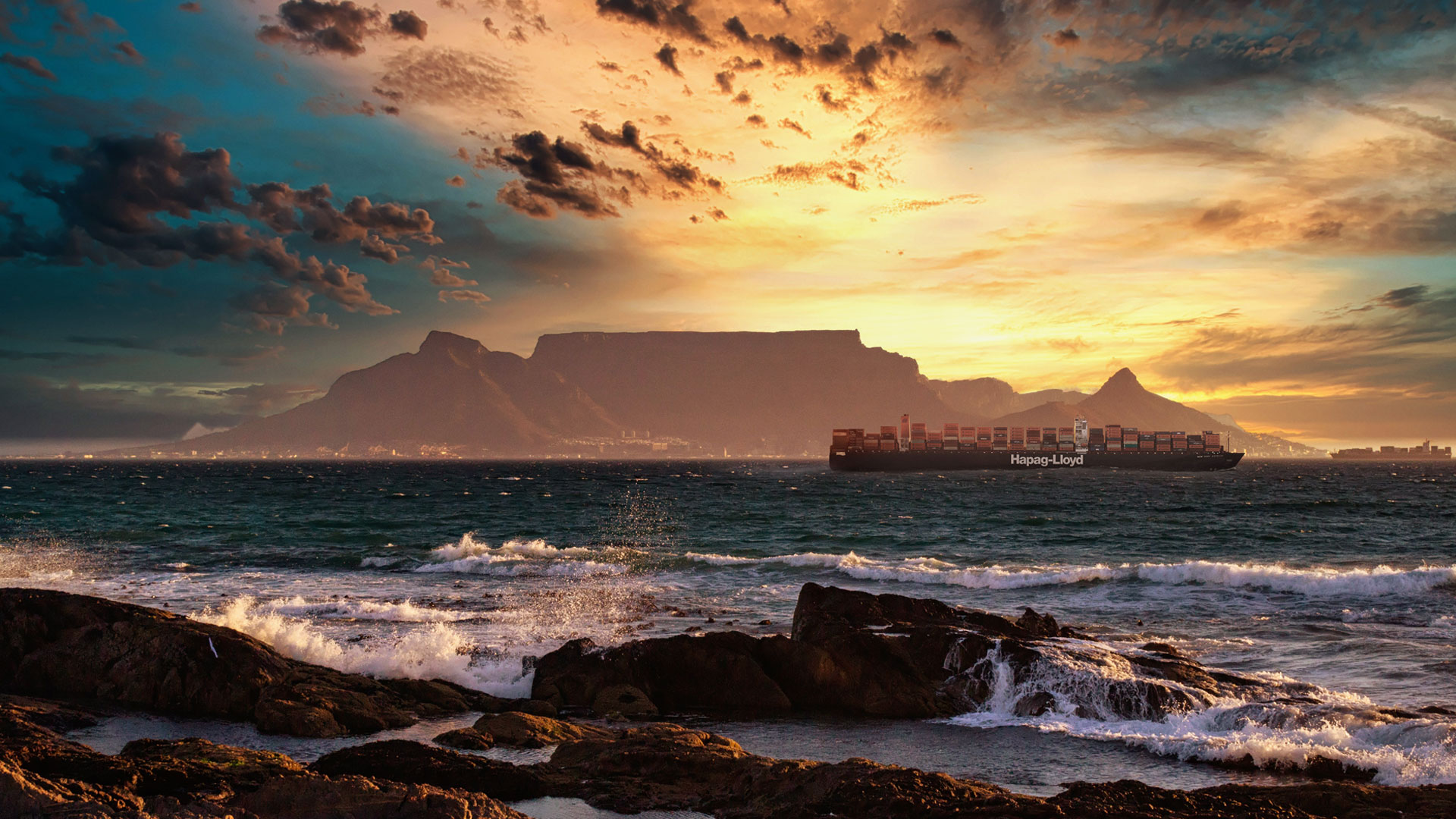The long wait for the breakthrough
The earth’s second largest continent is notable for its youthful and growing population, rich deposits of raw materials, and strong growth rates. It is ...

Current crises have once more put the focus on Africa. The continent will again become of greater importance for investment and trade partners. It is increasingly luring companies seeking to position themselves more diversely. African states also wish to diversify their businesses. Free and fair elections are taking place in a growing number of African countries. The continent’s economic growth has been climbing for a decade, and prospects are good.
A report by the Federal Ministry of Economics and Energy ascribes this to ongoing urbanization, an increasingly broad middle class, and a growing services sector. Investments in infrastructure and revenues from the sale of such raw materials as crude oil are also responsible for the growth. In addition, many African states – Kenya, for instance – are pursuing a build-up of renewable energies. The German Foreign Ministry stresses that Africa is bursting with potential: A youthful, growing population, a wealth of natural resources and strong growth rates.
Olaf Scholz, Federal German Chancellor, visited the three West/South African states of Senegal, Niger, and South Africa in May 2022. The primary objective was to strengthen economic relations. During a second trip in May this year, to Ethiopia and Kenya, the focus was again on economic topics, but he stressed the great importance of countering climate change and current conflicts.
“We must face up to a world that will be multi-polar, in which many countries of the global South will come to be highly significant,” said Scholz on his arrival in East Africa. He was plainly impressed by the fact that Kenya is already deriving more than 90 percent of its electric power from renewable energy sources. “Africa is of crucial importance for us in Germany, for us in Europe,” stressed the Chancellor. The countries of Africa need to be seen in a new light, and partnerships established on an equal footing.
The German Ministry of Economics and Climate Protection writes that apart from Africa’s opportunities for the future, the continent has immense challenges to master. Factors such as poverty, political instability and inadequate infrastructure confront Germany’s economic commitment and the activities of foreign investors with extraordinary background conditions, adding that Africa’s economic potential has been considerably exploited but is by no means exhausted yet. For many German enterprises, it not only since the energy crisis and pandemic that Africa is an attractive continent. Above all, South Africa is a significant trading partner for Germany, in that it possesses reserves of chrome, gold, manganese and platinum metals. Yet trade with Egypt, Libya, Tunisia, Nigeria, Morocco, Algeria, and Ivory Coast is also growing on account of their mineral deposits.
The Hamburg-based container shipping company Hapag-Lloyd entered the African sub-Saharan market 15 years ago and has reported a continual growth in transport volume to/from Africa ever since. Africa has been a particularly important market for the group since 2006, when Hapag-Lloyd and CP Ships merged. Activities in Senegal marked the start, whereupon the company soon also became active in South Africa, at the time in an alliance with Swiss liner shipowner Mediterranean Shipping Company (MSC) that has lasted more than ten years.
“Last year we took over the container liner business of German Africa Lines (DAL) to correspondingly expand our own there,” explains Sascha Godemann, Hapag- Lloyd’s Director Trade Management Africa. Takeover of DAL represents a splendid addition to existing activities on the continent of Africa, with the range to and from South Africa the main area to profit.
Integration of container liner activities is meanwhile completed. Hapag-Lloyd took on the 150 staff working in Hamburg and the DAL offices in South Africa. Similarly, the 6,589-TEU containership ‘Kalahari-Express’ plus the fleet of almost 18,000 owned and leased containers have been transferred to the ownership of the Hamburg-based shipowner.
A year earlier, Hapag-Lloyd acquired the NileDutch shipping company, specializing in Africa, in doing so clearly expanding its presence and service range to and from West Africa.
“Until than we had been represented in NW Africa, Ghana and Nigeria among other countries,” says Godemann. The acquisition added offices in Angola, the Congo and Cameroon. In South Africa the company now operates a headquarters in Durban, offices in Johannesburg and Cape Town, and a very dense agency network. NileDutch has contributed seven liner services, a transport capacity of around 35,000 TEU and an approx. 80,000-TEU container fleet. Hapag-Lloyd also has offices of its own in Morocco, Ghana, Nigeria, Kenya, and Senegal and has extended its network to East Africa with services to Kenya and Tanzania.
Morocco, for example, is an important exporter of such chilled produce as fruit, vegetables and seafoods and an important element of development strategy in the reefer trades segment. Among other goods that the country exports are minerals, chemicals, textiles and such foodstuffs as wheat maize, oilseeds and sugar. The main imports are of electronic equipment, spare parts, and foodstuffs. The country is linked with the global Hapag-Lloyd network via the port of Tanger-Med. In addition, the shipping company has taken a ten-percent stake in TC 3 – Container Terminal 3 in the Port of Tanger-Med 2.
From Senegal, Hapag-Lloyd mainly transports nuts, cotton, and minerals. The export of fish and fish products is also one of the country’s important sources of income. In 2023 a start is due to be made on offshore oil and gas production. Senegal’s main imports consist of chemicals, food, and textiles. The country is connected to the company’s network by the weekly WAX – West Africa Express. In East Africa, EAS 3 – East Africa Service 3 connects Kenya with the most important terminals in Singapore and Shanghai, while EAS2 – East Africa Service 2 links the country with India’s West coast and Jebel Ali in Dubai.
Across the whole of Africa, the company maintains 14 liner services plus three Intra-Africa Short Sea Services, with just a few exceptions, all with a weekly frequency. The key partners are Maersk, CMA and ONE, but the company also cooperates with PIL, GSL – Goldstar and ESL – Emirates Shipping Line. Hapag- Lloyd emphatically operates on the hub-and-spoke principle. “We are constantly in the process of finding synergies and optimizing and expanding our products – and not just in Africa,” explains Godemann. In recent years the company has reported double-digit growth in volume, partly generated naturally and partly through the purchase of additional carriers.
The Africa business meanwhile accounts for almost seven percent of Hapag-Lloyd’s total volume. The goal is to boost this share to between eight and nine percent shortly and to breach the one-million TEU barrier that is no longer far off. The company keeps the market under constant observation, monitors import and export data and accordingly exchanges knowhow with colleagues on the spot so as to discover where opportunities for further growth lie. “We check whether the business is profitable and what investment will be required. Are there any strategic partners whom one can bring in and what advantages for the Hapag-Lloyd world will result?” This analysis concludes with a simple Yes or No.
According to the Africa Business Guide published by Berlinbased GTAI – Germany Trade and Invest, in 2022 German foreign trade with Africa grew by 21.3 percent to a new, record level of 59.8 billion euros. Imports from Africa rose by 27.4 percent to 33.4 billion euros. From the Republic of South Africa alone, Germany imported goods worth 14.4 billion euros – after 12.3 billion euros in the previous year. Libya followed in second place, whence Germany imported almost only oil, to the value of 3.6 billion euros. Also supplying a share of Germany’s higher imports from Africa were oil producers Nigeria – with 1.9 billion euros – and Tchad – with 1.2 billion euros.
According to GTAI, German exports did not increase quite so fast, with a 14.5 percent rise to 26.4 billion euros. Here again, South Africa was right at the top with deliveries totalling 9.8 billion euros. In North Africa, Egypt – 4.2 billion euros – and Morocco – 2,8 billion euros – were the largest customer countries. Along with South Africa, in Sub-Saharan Africa it was Nigeria, taking exports worth 1.1 billion euros, the Ivory Coast, taking deliveries worth 334 million euros, and Kenya, taking exports totalling 260 million euros, that were important markets for Germany.
1. You have been active in Africa for more than a decade. Why is the continent a strategically important market for Hapag Lloyd?
The expectation is that in the next five to ten years, by comparison with world markets, the continent will be reporting the highest growth rates. We expect that further growth in containerized volume, and as a container carrier we see good chances of growing further there. The middle class in Africa is young and constantly growing, especially in South Africa or such industrial zones as Nigeria, Ghana, or Kenya. Saturated markets in industrialized countries or the familiar problems in business with Russia are awakening interest in the African market.

Companies like Volkswagen have already invested in local production plants. For example, this car group operates vehicle assembly facilities in South Africa, Kenya, Nigeria, Rwanda, and Ghana. India is also investing in Africa, for instance in textile production plants. Instead of bringing cotton for processing to Bangladesh, Pakistan or China, textiles are being manufactured on the spot and shipped to the USA, for example. The main objective are shorter transport routes, but another is to support the local population.
2. Which challenges do you have to confront and what is different by comparison with other continents?
Many African countries suffer from being drawn into conflicts. Political disturbances of the kind we are now experiencing in Sudan rage in many places. We always witness election or regime change with a great deal of interest, hoping that these do no result in disturbances. Millions of people in Africa still live below the poverty line and the general public rarely profits from growth. In many African countries, social tensions and corruption are a breeding ground for frustration and upheavals. People often lack any prospects. Hoping for a better life, country folk move into the towns. While a few African countries have even developed stable national economies in recent years, unstable working conditions with low wages are still widespread. The infrastructure in the ports, but above all in the hinterland, is a challenge. There are some foreign investors who are building roads, so far though many places lack good road and rail networks. Doing business is often made harder by challenges of an operative kind, e.g. draft limitations and port bottlenecks.
3. What tips would you give companies wanting to start doing business with Africa?
This question is one that it is by no means so simple to answer. Every country in Africa is different, there are so many differences, from coast to coast from country to country, that no general statement is feasible. Aiming to enter as a complete newcomer, specifically preparing for the country concerned and its market certainly makes sense. Which language is spoken there, can English or French be used to communicate? Which customs need to be observed? It is also sensible to get in touch with local companies, to listen and to learn, and above all to employ local staff. But take care, what is customary in Morocco must not necessarily function precisely the same way elsewhere. Nor should contact with the local authorities be neglected. Flexibility certainly pays. Incidentally, as a rule Germans are expected to be punctual.